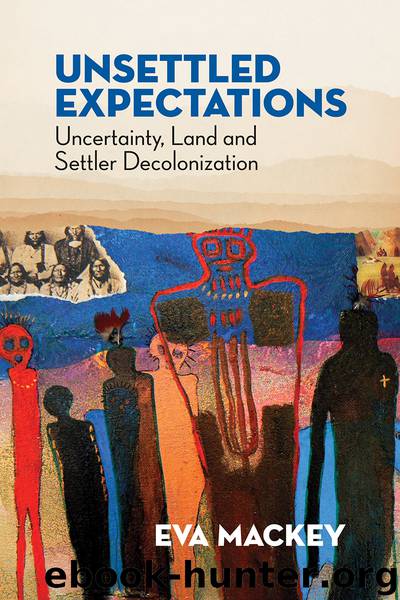Unsettled Expectations by Eva Mackey

Author:Eva Mackey
Language: eng
Format: epub
Publisher: Fernwood Publishing
Published: 2016-04-07T04:00:00+00:00
Part Three
IMAGINING OTHERWISE: EMBRACING SETTLER UNCERTAINTY
INTRODUCTION
Treaty as a Verb
The act of turning round, of shifting one’s orientation and redirecting the momentum by which one previously was impelled, offers possibilities for perceiving differently, for seeing and engaging in ways that less take for granted the jurisdictional matrix of the state and…compels a reconceptualization of the terms of occupancy for everyone. (Rifkin 2013, 336)
The theft of land has enabled our incredible achievements, and also our dreadful mistakes. It is up to us to reclaim our responsibilities as Settlers — as world makers, as dreamers and builders, and people who can work together despite our differences to achieve great things — and to use our powers, privileges, and skills differently. We built this world, we built the nations of Canada and America, but we did it by trying to destroy many other nations as part of the process. It’s time to reverse this process. (Barker 2013)
Over 40 years ago, in his book The Fourth World: An Indian Reality, George Manuel, Secwepemc chief, addressed what was necessary to change “Indian-European relations”:
When we come to a new fork in an old road we continue to follow the route with which we are familiar, even though wholly different, even better avenues might open up before us. The failure to heed (the) plea for a new approach to Indian- European relations is a failure of imagination. The greatest barrier to recognition of Aboriginal rights does not lie with the courts, the law, or even the present administration. Such recognition necessitates the re-evaluation of assumptions; both about Canada and its history and about Indian people and our culture…Real recognition of our presence and humanity would require a genuine reconsideration of so many people’s role in North American society that it would amount to a genuine leap of imagination. (Manuel and Posluns 1974, cited in Regan 2005, 3)
Manuel’s words continue to have a chilling power today, despite over 40 years of what many see as “improvement” or “progress” in the recognition of Indigenous rights. Deep, persistent and flexible epistemologies have developed over centuries, and have produced deep-seated settler self-evident certainty in entitlement. Although such ideas have shifted and changed flexibly over time and in different contexts, one consistency is that they have persistently constructed settler entitlement, jurisdiction and control of Indigenous people as natural. This has entailed perceiving Indigenous lifeways as inferior, undeserving and unacceptable, and sovereignty and land rights as unreasonable, unnatural and dangerous. In doing so, they have also repeatedly denied even the possibility of substantive Indigenous sovereignty and autonomy. Given the persistence of such frameworks, how might it be possible to imagine decolonized relationships between Indigenous and settler people in settler nations? If, as I have argued, the production and defence of settler certainty and settler futurity have been central to the ongoing colonial process, where do we go from here?
Theorizations about how to decolonize settler nation-states are being passionately debated, and no one pretends to know in advance what will be required. The process is necessarily uncertain.
Download
This site does not store any files on its server. We only index and link to content provided by other sites. Please contact the content providers to delete copyright contents if any and email us, we'll remove relevant links or contents immediately.
| Anthropology | Archaeology |
| Philosophy | Politics & Government |
| Social Sciences | Sociology |
| Women's Studies |
Cecilia; Or, Memoirs of an Heiress — Volume 1 by Fanny Burney(31357)
Cecilia; Or, Memoirs of an Heiress — Volume 3 by Fanny Burney(30954)
Cecilia; Or, Memoirs of an Heiress — Volume 2 by Fanny Burney(30909)
The Great Music City by Andrea Baker(21817)
We're Going to Need More Wine by Gabrielle Union(18090)
Bombshells: Glamour Girls of a Lifetime by Sullivan Steve(13122)
Pimp by Iceberg Slim(12953)
All the Missing Girls by Megan Miranda(12786)
Fifty Shades Freed by E L James(12467)
Talking to Strangers by Malcolm Gladwell(11919)
Norse Mythology by Gaiman Neil(11914)
Crazy Rich Asians by Kevin Kwan(8378)
Mindhunter: Inside the FBI's Elite Serial Crime Unit by John E. Douglas & Mark Olshaker(7854)
The Lost Art of Listening by Michael P. Nichols(6492)
Enlightenment Now: The Case for Reason, Science, Humanism, and Progress by Steven Pinker(6420)
Bad Blood by John Carreyrou(5786)
The Four Agreements by Don Miguel Ruiz(5536)
Weapons of Math Destruction by Cathy O'Neil(5058)
We Need to Talk by Celeste Headlee(4888)
